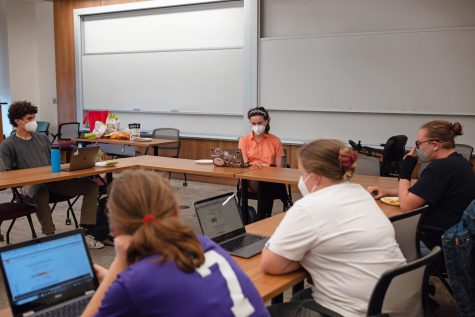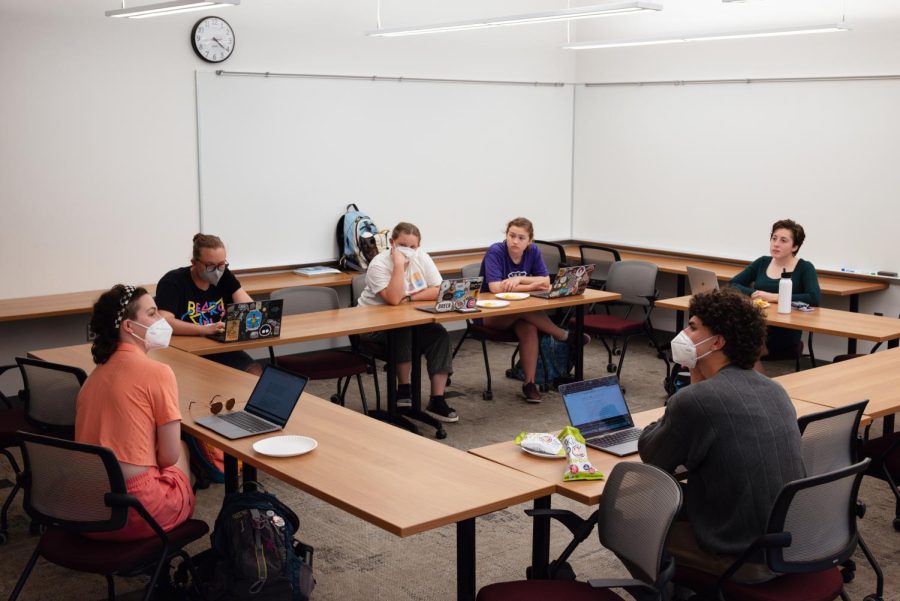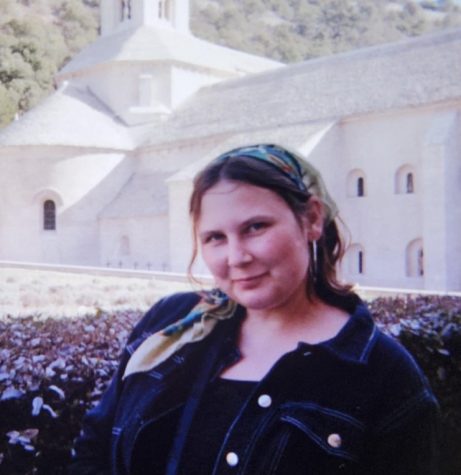Farm House leads discussions on anti-racist agriculture
Residents of Farm House discussed ways to collaborate with community organizations.
April 24, 2023
“But how can we connect this to antiracism on campus?” Sophia Unzicker `26 posed this question to the five other students attending the antiracist agriculture reading group on Wednesday afternoon in the Humanities and Social Studies Center. The group comprised several Farm House residents and two other Grinnell College students.
Phil Tyne `24 got the idea for an anti-racist reading group after going through the Farm House email account and finding an email from the National Young Farmers Coalition with a racial equity toolkit attached. This toolkit is composed of readings exploring racial equity in farming as well as suggested assignments and discussion questions for facilitating group conversation.
“This really was just a start on our end to make sure that we are engaging with this material and recognizing that agriculture and farming is an inherently white-dominated space,” said Tyne. “For those things to be deconstructed and changed, we have to make sure that we are aware and engaging with those uncomfortable discussions.”

The first two reading groups were held on Feb. 22 and March 8, the dates chosen to best accommodate the other events happening on campus. Tyne and fellow Farm House resident Tristan Davis `25 selected a main reading for each meeting as well as other optional readings related to each day’s main topic. The first meeting aimed to introduce participants to antiracism and agriculture, the second focused on engaging with theory around the topics. The third reading group was held on April 19 and aimed at tackling the question — What’s next?
“Whenever, as Grinellians, we engage in these really hard topics, oftentimes it comes away feeling like, ‘well, now what are we going to do?’” said Tyne.
The reading selected for the April 19 meeting was “4 Not-So Easy Ways to Dismantle Racism in the Food System,” by Leah Penniman. Conversation shifted from initial responses to the reading to a broader discussion on the use of pesticides on campus, where food in the Dining Hall is sourced and how these issues affect different groups on campus in distinct ways.
Lucy Suchomel `24 brought up the disparity in access to organic or locally sourced food determined by who can afford to live off campus and opt out of the meal plan. Access to a vehicle could also determine a student’s access to any groceries, and choosing to shop at McNally’s or Fareway is dependent on a student’s financial situation.
Tyne noted that any discussion around the effects of pesticide use on campus could not be conducted without involving facilities management and acknowledging the frequent disconnect between students and staff on Grinnell’s campus. Frequently throughout their discussion, participants returned to how these topics could be approached with a dedication to antiracism.
Unzicker pointed out how important it is to utilize the resources and infrastructure already available when organizing around sustainability. She noted that often, just putting in time and labor are more important than generating more ideas.
Participants listed multiple student and community organizations as potential collaborators throughout the discussion, including the Student Environmental Committee which is affiliated with the office of sustainability at the College, the Center for Prairie Studies and Imagine Grinnell, a partner program of the Claude W. and Dolly Ahrens Foundation.
“There’s so much stuff going on, but we’re kind of disconnected,” said Unzicker in reaction to the many sustainability-oriented organizations on campus and in the town of Grinnell.
“Is there a way to collate all the environmental activity happening at the College and in the community?” asked Hemlock Stanier `25, who also lives in Farm House. Participants considered creating a newsletter or social media page to facilitate communication between these organizations. The group settled on compiling a list of organizations to connect with and encourage attendance at the Eco Campus regular meetings open to all students, faculty and staff.
Tyne and the other organizers said they hope to continue the reading group and related programming next year, and that using Farm House as a meeting space open to all students interested in farming and antiracist work is a priority.





















































